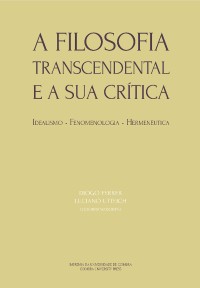Please use this identifier to cite or link to this item:
https://hdl.handle.net/10316.2/38237| DC Field | Value | Language |
|---|---|---|
| dc.contributor.author | Utteich, Luciano Carlos | |
| dc.date.accessioned | 2015-12-15T15:50:41Z | |
| dc.date.accessioned | 2020-09-10T16:02:57Z | - |
| dc.date.available | 2015-12-15T15:50:41Z | |
| dc.date.available | 2020-09-10T16:02:57Z | - |
| dc.date.issued | 2015 | - |
| dc.identifier.isbn | 978-989-26-1048-1 | |
| dc.identifier.isbn | 978-989-26-1049-8 (PDF) | |
| dc.identifier.uri | https://hdl.handle.net/10316.2/38237 | - |
| dc.description.abstract | In a note in Religion within the Limits of Reason Alone (1793), Kant comments Schiller’s utterance, contained in On Grace and Dignity (1793), as having associated the aesthetic element (grace) to the purely moral element (dignity). However, such an approach is impracticable due to the dignity of the law. From other texts by Schiller, such as the fragment of the Lectures on Aesthetics (1792‑‑ 3), On the Sublime (1793), On the Usefulness of Moral Customs Aesthetic (1793) and Letters on the Aesthetic Education of Man (1795) one can show that he does not thought the interaction between grace and dignity in the form it was imputed him by Kant. Without attracting to itself the aesthetic element (grace), in Schiller’s understanding the dignity does not reject it, in the face of it should not leave involve itself in the extremes of the human condition, to the savage and the barbarian. We demonstrate this by thematising the notions of allocation and disinterested affection. | eng |
| dc.description.abstract | Em nota a A Religião nos Limites da Simples Razão (1793), Kant comenta a exposição de Schiller, em Graça e Dignidade (1793), como tendo associado o elemento estético (graça) ao elemento puramente moral (dignidade) sendo, porém, tal aproximação indevida em face da dignidade da lei. A partir dos demais textos de Schiller, como o Fragmento das Preleções sobre Estética (1792‑‑ 3), Do Sublime (1793), Sobre a Utilidade Moral de Costumes Estéticos (1793) e as Cartas sobre a Educação Estética do Homem (1795), pode‑‑ se mostrar que este não pensou a interação entre graça e dignidade no modo como lhe imputara Kant. Sem atrair para si o elemento estético, na compreensão schilleriana a dignidade antes não o rejeita, em face de não dever se deixar associar aos extremos da condição humana, a do selvagem e a do bárbaro. Isso pode ser demonstrado tematizando‑‑ se as noções de destinação e afeto desinteressado. | por |
| dc.language.iso | por | - |
| dc.publisher | Imprensa da Universidade de Coimbra | por |
| dc.relation.ispartof | http://hdl.handle.net/10316.2/38234 | por |
| dc.rights | open access | - |
| dc.subject | Transcendental philosophy | eng |
| dc.subject | Faculty of aesthetic judgment | eng |
| dc.subject | Moral law | eng |
| dc.subject | Duty | eng |
| dc.subject | Taste | eng |
| dc.subject | Filosofia transcendental | por |
| dc.subject | Faculdade de juízo estético | por |
| dc.subject | Lei moral | por |
| dc.subject | Dever | por |
| dc.subject | Gosto | por |
| dc.title | Harmonia e autonomia da aparência em Schiller: o transcendental revisitado | por |
| dc.title.alternative | Harmony and Autonomy in Schiller: the transcendental revisited | eng |
| dc.type | bookPart | por |
| uc.publication.firstPage | 83 | - |
| uc.publication.lastPage | 130 | - |
| uc.publication.location | Coimbra | por |
| dc.identifier.doi | 10.14195/978-989-26-1049-8_3 | - |
| uc.publication.digCollection | PB | por |
| uc.publication.orderno | 3 | - |
| uc.publication.area | Ciências Sociais | por |
| uc.publication.bookTitle | A Filosofia Transcendental e a sua crítica | - |
| uc.publication.manifest | https://dl.uc.pt/json/iiif/10316.2/38237/212990/manifest?manifest=/json/iiif/10316.2/38237/212990/manifest | - |
| uc.publication.thumbnail | https://dl.uc.pt/retrieve/11197203 | - |
| uc.publication.parentItemId | 54541 | - |
| uc.itemId | 70637 | - |
| item.grantfulltext | open | - |
| item.fulltext | With Fulltext | - |
| Appears in Collections: | A Filosofia Transcendental e a sua crítica | |
Files in This Item:
| File | Description | Size | Format | |
|---|---|---|---|---|
| harmonia_e_autonomia_da_apar_ncia_em_schiller._o_transcendental_revisitado.pdf | 897.3 kB | Adobe PDF |  |
Items in DSpace are protected by copyright, with all rights reserved, unless otherwise indicated.
